|
|
|
Sort Order |
|
|
|
Items / Page
|
|
|
|
|
|
|
| Srl | Item |
| 1 |
ID:
138956
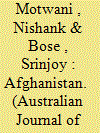

|
|
|
|
|
| Summary/Abstract |
The ongoing international military withdrawal from Afghanistan has set the stage for energising the activities of Afghanistan’s external stakeholders to re-evaluate their activities. The possible return of the Taliban in some form could compel Afghanistan’s current external partners—Iran, India and Russia—to turn into limited spoilers. The absence of an international guarantor in Afghanistan from December 2014 is likely to encourage Pakistan—a greedy spoiler—to intensify its meddling as a means to reposition the Taliban—a total spoiler—at the helm of Afghan affairs. The combination of limited, greedy and total spoilers threatens to undermine security and state-building processes.
|
|
|
|
|
|
|
|
|
|
|
|
|
|
|
|
| 2 |
ID:
138955
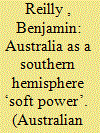

|
|
|
|
|
| Summary/Abstract |
The 2014 Group of 20 (G20) leaders’ meeting in Brisbane was hailed as the largest gathering of international leaders ever held in Australia. While media attention was focused on the presidents of great powers of the northern hemisphere—the USA, China and Russia in particular—the meeting also featured the first Australian gathering of the major powers of the southern hemisphere, including Argentina, Brazil, Indonesia, South Africa and, of course, Australia itself.
|
|
|
|
|
|
|
|
|
|
|
|
|
|
|
|
| 3 |
ID:
138957
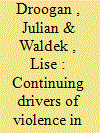

|
|
|
|
|
| Summary/Abstract |
The Regional Assistance Mission to Solomon Islands (RAMSI) has provided a relative decline of violence in Honiara for over a decade. However, the combination of customary cultural practices utilised in negotiating status and power in Solomon Islands society with ongoing demographic and economic processes exacerbated by the period of foreign intervention has perpetuated underlying drivers of violence that are likely to reignite once RAMSI fully departs. The use of practices of social reciprocity and compensation in order to gain and effectively wield key resources such as cash, access to jobs and access to land is ongoing in Honiara, where new opportunities provide new pathways to utilising these practices by growing cohorts of youth. This article examines the use of these forms of negotiation in Honiara and argues that three ongoing processes are likely to drive future outbreaks of violence in the capital once RAMSI departs: a rapidly expanding urba; ongoing contestation over access to land; and the effects of international investment and presence of urban foreign enclaves.
|
|
|
|
|
|
|
|
|
|
|
|
|
|
|
|
| 4 |
ID:
138958
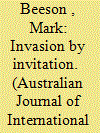

|
|
|
|
|
| Summary/Abstract |
Alliances continue to occupy a prominent place in the Asia-Pacific's security architecture. For many regional states such as Australia and Japan, their respective alliances with the USA are the unchallenged foundations of their security. But when the rise of China is causing major change in the region, and when many countries are increasingly reliant on China economically, is the region's network of alliances any longer appropriate or useful? This article reviews alliances in theory and practice, and argues that, while alliances are unlikely to disappear, their utility is nothing like as clear-cut as many of their supporters would have one believe.
|
|
|
|
|
|
|
|
|
|
|
|
|
|
|
|
| 5 |
ID:
138954
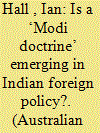

|
|
|
|
|
| Summary/Abstract |
Narendra Modi’s election as India’s prime minister in May 2014 has generated speculation that a new ‘Modi doctrine’ is emerging in Indian foreign policy. This article assesses the evidence for that claim. It argues that a ‘doctrine’ should embody a set of clearly stated principles for foreign policy making. It analyses the main achievements of Modi’s policy in the months after his election. It finds that while Modi has brought new energy to the conduct of foreign policy, his approach is essentially pragmatic, and his objectives are similar to those pursued by his two immediate predecessors— Atal Bihari Vajpayee and Manmohan Singh.
|
|
|
|
|
|
|
|
|
|
|
|
|
|
|
|
| 6 |
ID:
138960


|
|
|
|
|
| Summary/Abstract |
Australia's new-found post-colonial ‘independence’ in 1901 initially required it to continue to hold on to the apron strings of its colonial master. After World War II, these needs changed, as did the geopolitical power of the leading nations. For Australia, there would be the need to secure its borders, build its labour power, find security arrangements, and adhere to a cold war framework in its geographical region. The USA and the Asian region fell into Australia's sphere of interest. Italy, on the other hand, was a nation of contrasting interests and perspectives. Besides being located in Europe, the post-war period defined Italy by its participation in the concept of a European community and an entirely different set of allies, concerns and trajectories, which made it position itself in a different orbit than that of Australia. Australia's changing economic and social needs required a new and vast migration program in 1947, which would change the dynamics of its relationships. Enter Italy. The two countries now had common destinies in relation to migration—Australia needed people to help build its country, whilst Italy encouraged its impoverished rural population to emigrate to this distant and foreign land. A relationship was born.
|
|
|
|
|
|
|
|
|
|
|
|
|
|
|
|
| 7 |
ID:
138959


|
|
|
|
|
| Summary/Abstract |
Since the 1990s, governments of the Organisation for Economic Co-operation and Development (OECD) have begun to promote their foreign aid politics domestically via global education. This policy remit has its origins in civil society and has been combined with a stated aim on the part of governments to prepare populations for globalisation, but also to convince populations of the need for increased aid spending in the context of various challenges, including calls for aid effectiveness, large-scale protest by the metropolitan left and rising parochialisms that diminish cosmopolitan world views. In the context of the apparent spontaneity of political mobilisation globally, this article seeks to qualify the optimism of the political sociology and social movements literature on the network society by comparing two OECD government remits for global/development education in the UK and Australia, which are attempts to manage or socially engineer civic activism and engagement. The problem which this article addresses is that, on the face of it, state funding of ‘global education’ appears to be a success of the activism of educators combined with the networked advocacy efforts of development non-governmental organisations, except that it has occurred in tension with international drivers to use education to further global economic competitiveness and governments' desire to promote their own foreign aid spending in a climate of falling legitimacy. This phenomenon of state funding for global education might be considered an elaboration of network politics, but this article argues that it must equally be read, via Gramsci, as a hegemonic contest in the struggle for subject production appropriate to the global knowledge economy.
|
|
|
|
|
|
|
|
|
|
|
|
|
|
|
|
|
|
|
|
|